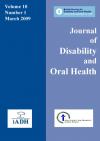Journal of Disability and Oral Health

- Cover Date:
- March 2009
- Print ISSN:
- 1470-8558
- Electronic ISSN:
- 1754-2758
- Vol:
- 10
- Issue:
- 1
Oral Health Assessment 1.pdf
Abstract Aims: To investigate oral health risk assessment (OHRA) practice for adults with intellectual disabilities in Scotland. Materials and methods: Two stage postal survey. In Phase 1, Clinical Dental Directors in all 15 Scottish Health Boards were asked to provide any written material pertaining to OHRA for adults with learning disabilities. In Phase 2, dentists and dentally qualified directors and consultants were asked whether a range of 39 OHRA elements were undertaken. These covered the following broad themes: care scale (9 items); risk factors (16 items); follow–up (7 items); and integration (7 items). Results: In Phase 1, all 15 Health Board areas responded, with eight providing written material. In Phase 2, 179 of 253 dentists (including directors and consultants) gave information on current OHRA practice (response rate: 71%). Items most frequently assessed (i.e. reported by at least 50% of dentists) were: dental treatment needs; both dental and other oral problems; urgency of treatment need; whether examination was incomplete; diet and sugary drinks consumption; brushing adequacy; and consent to treatment issues. Far less frequently mentioned items related to follow-up and the wider integration of OHRA in care planning, carer contact and support. Dentists who saw more adults with learning disabilities tended to report greater coverage of assessment items – particularly of risk factors (r=0.27, n=124, p=0.002). Dentists working in areas which had submitted written material in Phase 1 did not report more comprehensive assessment practice. Conclusions: Dentists’ reports suggest that often OHRA was limited to items of immediate clinical relevance rather than a comprehensive review of risk factors or an ongoing process of risk management in collaboration with other individuals and agencies, and that this practice may have developed from clinician experience rather than guidance.
Key words: Learning disability, assessment, oral health
- Article Price
- £15.00
- Institution Article Price
- £
- Page Start
- 11
- Page End
- 17
- Authors
- S.Turner, T. Lamont, H. Chesser, L. Curtice, Karen Gordon, S. Manton, A. Martin, T. Welbury, M.P. Sweeney
Articles from this issue
- Title
- Pg. Start
- Pg. End
- A survey of the quality and quantity of Special Care Dentistry teaching, including Gerodontology, in dental schools of the United Kingdom and Ireland
- 3
- 10
- Oral health risk assessment of adults with learning disabilities: (2) Attitudes of dentists and care staff
- 18
- 24
- A preliminary investigation into aspects of oral health of Bangladeshi young adults with a learning disability in Tower Hamlets
- 25
- 35
- Management of exaggerated gag reflex using conscious sedation techniques in endodontic therapy - a pilot study
- 36
- 40
